Ultimate AMD PC: what to buy and how to build it
Are AMD CPU's really the weak link we've been led to believe?
How we tested
No-compromise gaming is what we're interested in here. Proper, modern games at really high settings. We want to know if full AMD platforms can cut it.
Don't worry, therefore, about frame rate comparisons. Focus on the bottom line. Does a given platform deliver playable frame rates? Along with the three core AMD platforms and the reference rig built from Intel and Nvidia kit, we've thrown in some mashups.
First, we dropped the Radeon HD 7970 into the low-end and mid-range AMD platforms. We also tried Nvidia graphics with AMD and, in turn, AMD graphics with an Intel CPU.
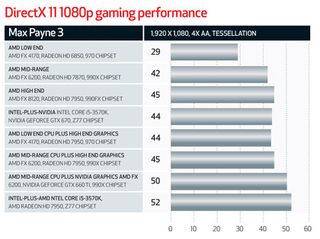
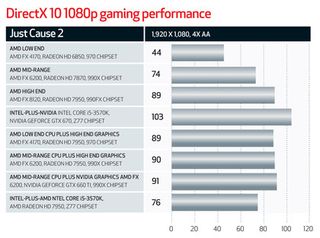
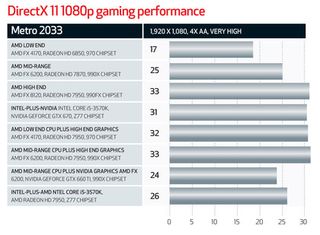
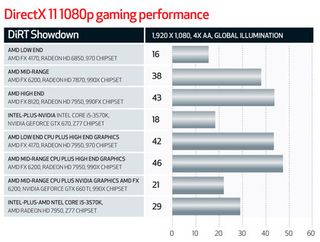
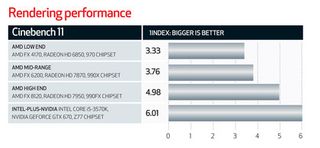
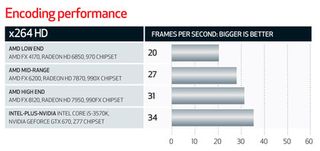
And the winner is… AMD (and your wallet)
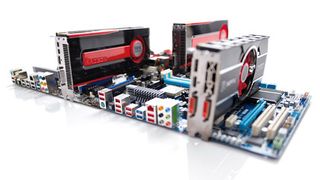
We've run a few features of late aimed at exploding conventional wisdom. One of the best involved a contest between a £300 and £3,000 system to see if paying more made a tangible difference. Sure enough, our expert game testers couldn't tell the difference in blind tests. So much for cutting-edge kit.
But the results of this all-AMD escapade are easily the most dramatic of the lot. The context coming in was two-fold. On the one hand, there's Intel's absolute domination in terms of outright CPU performance. It's been going on for years. On the other is Nvidia's Kepler generation of graphics cards, which seemed to have the edge over AMD's Southern Islands crew.
For the CPU half of the equation, you could argue that we've learned nothing new. Even Intel's mid-range Core i5-3570K has a clear performance advantage over anything AMD can offer. But the emphasis here is that outright, objective measures of performance are irrelevant. What matters is the subjective computing and gaming experience.
Then factor in how much you're paying for it and you're in a much better position to pick a PC processor. In truth, we weren't entirely confident that AMD's kit could really hack this sort of scrutiny, but the oft-maligned FX processor performed far beyond our expectations.
Get daily insight, inspiration and deals in your inbox
Get the hottest deals available in your inbox plus news, reviews, opinion, analysis and more from the TechRadar team.
Critically, it delivers good enough performance when and where it really matters. Yes, Intel's Core chips are nearly always faster, but nearly always in a manner you're not going to notice if we're talking games. If you've got 60 frames per second, there's slim to no benefit in adding another 20.
Once you've realised that, all sorts of options open out, especially when it comes to maximising graphics spend, bringing us neatly to the AMD versus Nvidia contest.
This was much closer to begin with, and close it remains, but the evidence that Nvidia's Kepler GPUs might habour a few flaws is beginning to build. There also seems to be at least some truth in AMD's claims that its GPUs work best with its own CPUs.
As to PC Format's overall recommendation, the CPU choice comes down to the six- and eight-core FX options. The quad-core 4000 Series fails on both value and performance grounds, but mainly it's just not cheap enough.
At stock clocks, it's actually the six-core FX 6200 that delivers the best performance thanks to its higher clocks, but an overclocked FX 8120 for just £20 more is awfully tempting.

On the graphics side, we'd beg you to steer clear of anything with less than 2GB of memory. Data swapping over the PCI Express bus must be avoided at all costs. Generally we're going to assume that going with an AMD processor and motherboard has freed up a little cash for you. With Radeon HD 7950s now available for just over £200, you can put together a fantastic all-AMD core component combination for well under £400. Fantastic.
Let's be clear. We're not suddenly reversing our recommendations of recent years, though we have to admit the results come precariously close to justifying that sort of stance. Intel and Nvidia still make excellent kit.
No, what we've really done is show that AMD still has plenty to offer. Much more than we'd given it credit for of late. So, if you're building a new PC, and especially if gaming is your number one priority, all of AMD's product lines - CPU, GPU and motherboard chipset - should be on your list.
Depending on your budget - and we're not merely talking about poverty-spec PCs, there's a real chance all-AMD is the way to go. At the very least, a few more options just opened out. Hallelujah.
Technology and cars. Increasingly the twain shall meet. Which is handy, because Jeremy (Twitter) is addicted to both. Long-time tech journalist, former editor of iCar magazine and incumbent car guru for T3 magazine, Jeremy reckons in-car technology is about to go thermonuclear. No, not exploding cars. That would be silly. And dangerous. But rather an explosive period of unprecedented innovation. Enjoy the ride.
Most Popular


